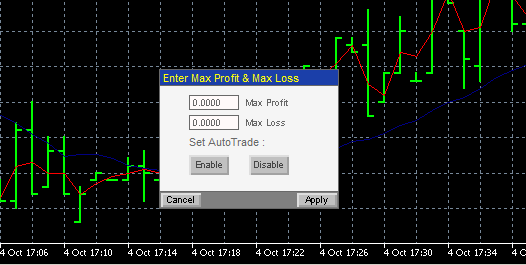Well , wrote one post on my mql4examples.blogspot.com and found writing problems on blog is fun !!
Leave it for now ...
lets get back to business , my client want me to develop an EA which takes input from a pop up
window and I suggested a form attached to charts , using mql5 object library .
But It seems he is not satisfied with the way GUI looks and takes input , forget it , I know the other solutions too : )
Let me explain you how I coded to take input to EA from GUI :
I gone though the Mql5 site , tried to found different solutions users suggested and in essence I wrote something like this :
#property copyright "Copyright 2012, MetaQuotes Software Corp."
#property link "http://www.mql5.com"
#property version "1.00"
#include <IncGUI_v3.mqh>
very familiar snippet code : just inclued the IncGUI_v3.mqh ,which I found on mql5 website ,
class CForm1: public CFormBase{
public:
//1. Declaring the controls
CInputBox in1;
CInputBox in2;
CLabel lblAuto;
CButton buttYes;
CButton buttNo;
protected:
// 2. Declaring the variables to restore the control values
string m_InputBoxValue;
string m_InputBoxValue2;
void MainProperties(){
// Setting the form parameters
m_Name = "Form1"; // Form name. The names of all the controls should start with it.
m_Width = 300; // Form width
m_Height = 100; // Form height
m_Type = 1; m_Caption = "Enter Max Profit & Max Loss"; // Form caption
m_Movable = false;
m_Resizable = false;
m_CloseButton = false;
}
void OnInitEvent(){
frm1.in1.Init("in1",50,4," Max Profit");
frm1.in2.Init("in2",50,4," Max Loss");
frm1.lblAuto.Init("labAuto","Set AutoTrade : ");
frm1.buttYes.Init("yesBut",40,20,"Enable");
frm1.buttNo.Init("noBut",40,20,"Disable");
in1.SetValue(GlobalVariableGet("gprofitLimit"));
in2.SetValue(GlobalVariableGet("glossLimit"));
}
void OnShowEvent(int aLeft,int aTop){
// 6. Calling the Show(x,y) method for all the controls of the form
frm1.in1.Show(aLeft+30,aTop+10);
frm1.in2.Show(aLeft+30,aTop+30);
frm1.lblAuto.Show(aLeft+30,aTop+50);
frm1.buttYes.Show(aLeft+30,aTop+70);
frm1.buttNo.Show(aLeft+90,aTop+70);
}
void OnHideEvent(){
// 7. Calling the Hide() method for all the controls of the form
in1.Hide();
in2.Hide();
buttNo.Hide();
buttYes.Hide();
lblAuto.Hide();
}
void OnWindowChangeEvent(int aSubWindow){
// 8. Calling the SetSubWindow() method for all the controls of the form. The subwindow number is conveyed by the aSubWindow parameter.
in1.SetSubWindow(aSubWindow);
in2.SetSubWindow(aSubWindow);
lblAuto.SetSubWindow(aSubWindow);
buttNo.SetSubWindow(aSubWindow);
buttYes.SetSubWindow(aSubWindow);
}
void EventsHandler(const int id,const long& lparam,const double& dparam,const string& sparam){
// 9. Calling the Event() method of all the controls.
// 10. Handling the control events, where necessary
in1.Event(id,lparam,dparam,sparam);
in2.Event(id,lparam,dparam,sparam);
int eventYes = buttYes.Event(id,lparam,dparam,sparam);
int eventNo = buttNo.Event(id,lparam,dparam,sparam);
if(eventYes==1){GlobalVariableSet("gautoTrade",1); MessageBox("Enabled !","Alert !"); }
if(eventNo==1){GlobalVariableSet("gautoTrade",0); MessageBox("Disabled !","Alert !"); }
}
bool OnApplyEvent(){
// 11. Checking the control values upon closing by the "Apply" button. In order to reject the closing of the form, false should be returned from this method.
// 12. Saving the parameters.
string val=in1.ValueString(); // entered value in input box
string val2=in2.ValueString();//entered value in input box 2
StringTrimLeft(val);
StringTrimRight(val);
Alert("apply alert ");
m_InputBoxValue=in1.ValueString(); // Save the value in a variable of the form in order to restore the value in the future in case the cancel button has been pressed
m_InputBoxValue2=in2.ValueString();
Alert(" Value entered: "+in1.ValueString()," value entered 2 "+in2.ValueString());
GlobalVariableSet("gprofitLimit",StringToDouble(m_InputBoxValue));
GlobalVariableSet("glossLimit",StringToDouble(m_InputBoxValue2));
return(true);
}
onApplyEvent() : here we will be catching the entered value when Apply button is pressed . see I have set my global variable gProfitLimit and gLossLimit using those entered input.
bool OnCancelEvent(){
// 13. Checks upon closing by the "Cancel" or "Close" buttons. In order to reject the closing of the form, false should be returned from this method.
if(MessageBox("Close? ",Caption(),MB_YESNO)!=IDYES){
// GlobalVariableSet("gautoTrade",0);
return(false);
}
//in1.SetValue(m_InputBoxValue); // Pressed cancel, restoring the value
/// in2.SetValue(m_InputBoxValue2);
return(true);
}
};
CForm1 frm1; // declaration of reference to form class.
void OnChartEvent(const int id,
const long &lparam,
const double &dparam,
const string &sparam)
{
//---
frm1.Event(id,lparam,dparam,sparam);
}
So using GUI library and writing the form and attaching two inputbox , one level , two button , the library provide apply and cancel button inbuilt in code .
how turn to call this form from our EA code , can be from init() , start () as per your wish , I loaded form inside EA init() , it code look like following code snippet
void init() //EA init method
{
frm1.Init();
fm1.Show(350,250) } // thats it here your form will be shown on you chart . Enter the value and see !
Hmm !!! hoping to put more problem here in future , till then
Take Care
Happy Coding .

Hey Everybody,
ReplyDeleteFor those of you who are interested in generating profits by FOREX autotrading,
I would like to recommend a unique forex autotrading instrument.
It's called EA Builder and it allows you to create custom Forex Indicators and Trading Strategies.
The solution includes many features such as:
* Custom Arrows and Alerts
* Automated Trading System
* Trade Just About Anything
* Alerts
* Money Management
INSTANT ACCESS: EA Builder